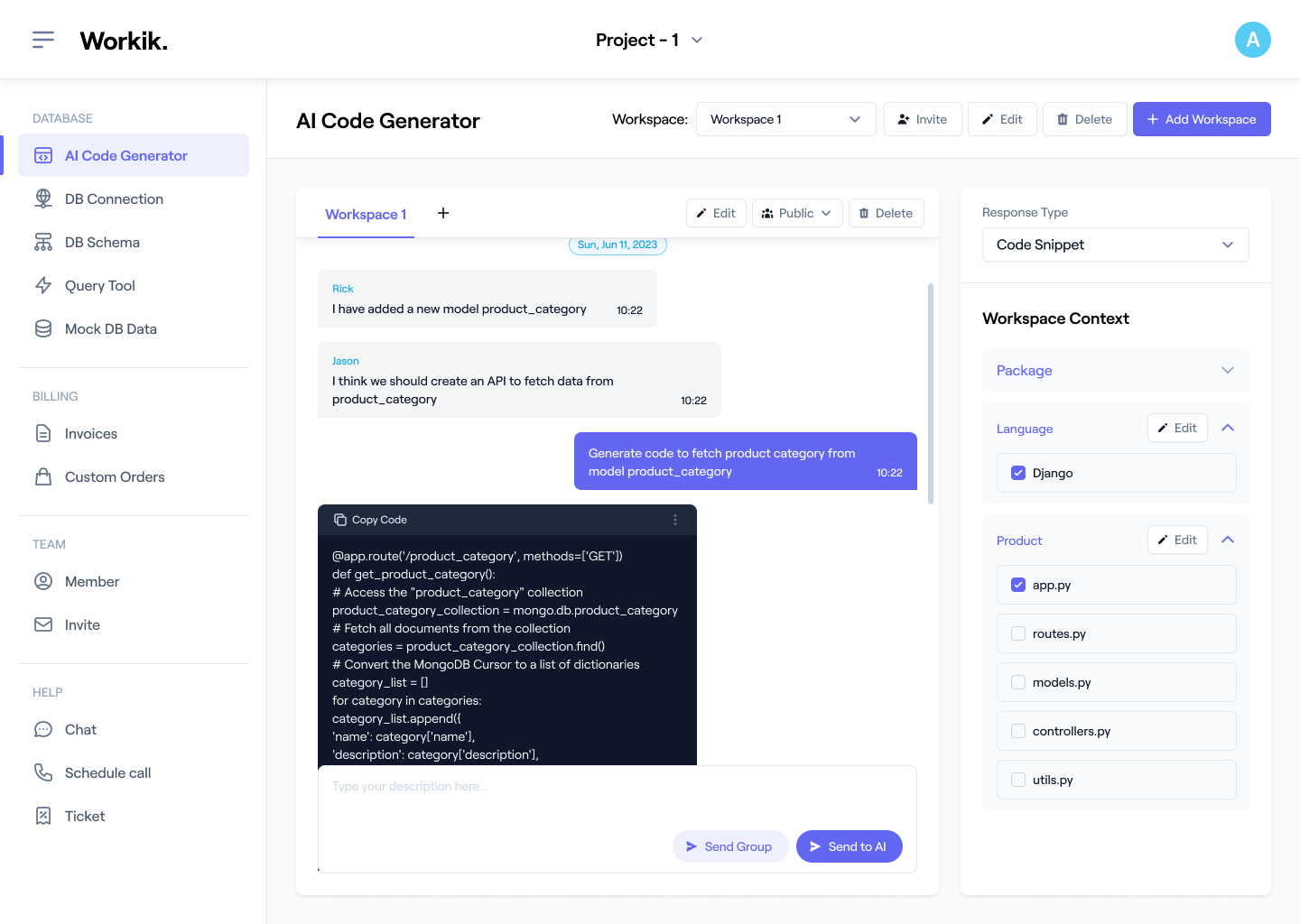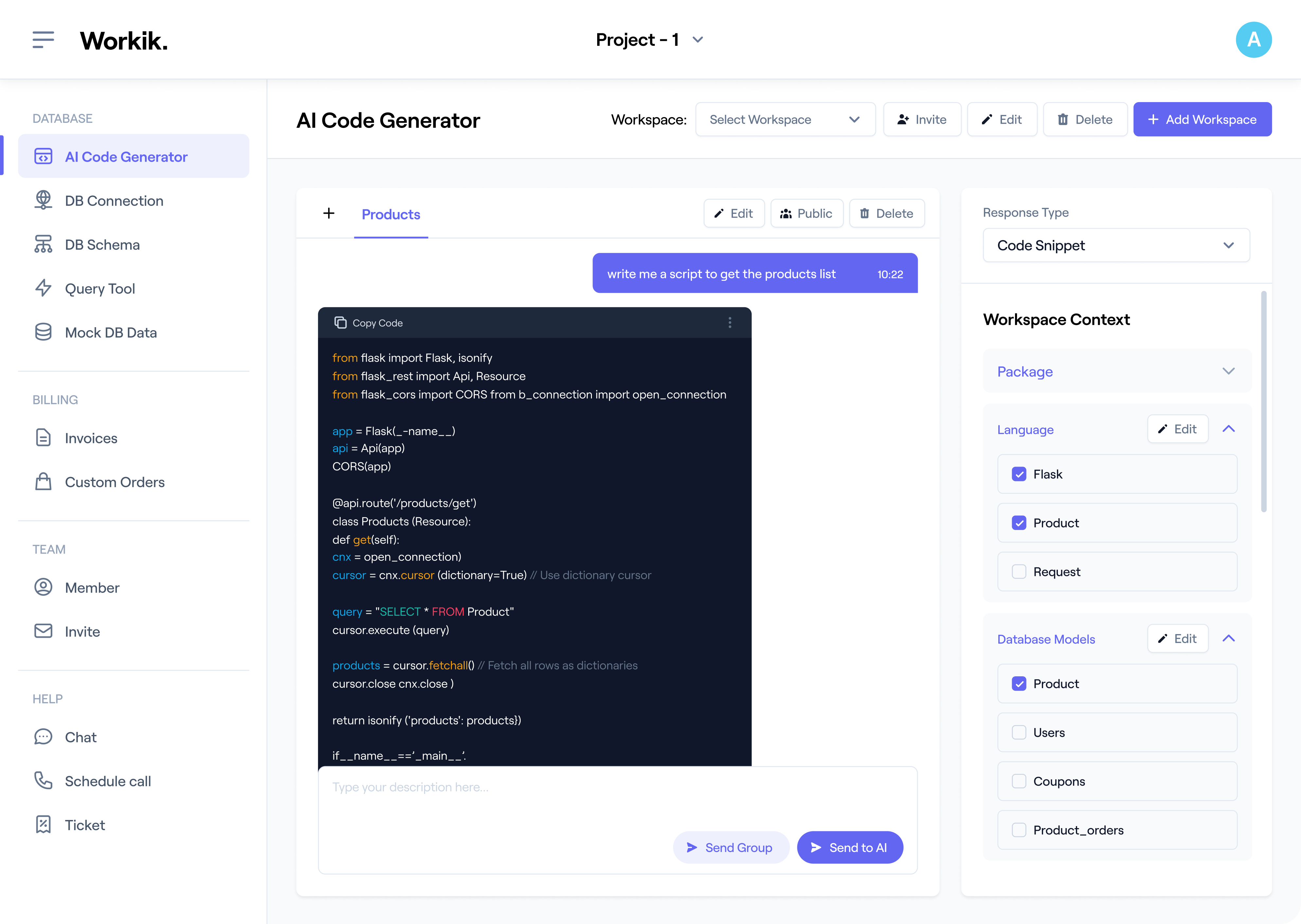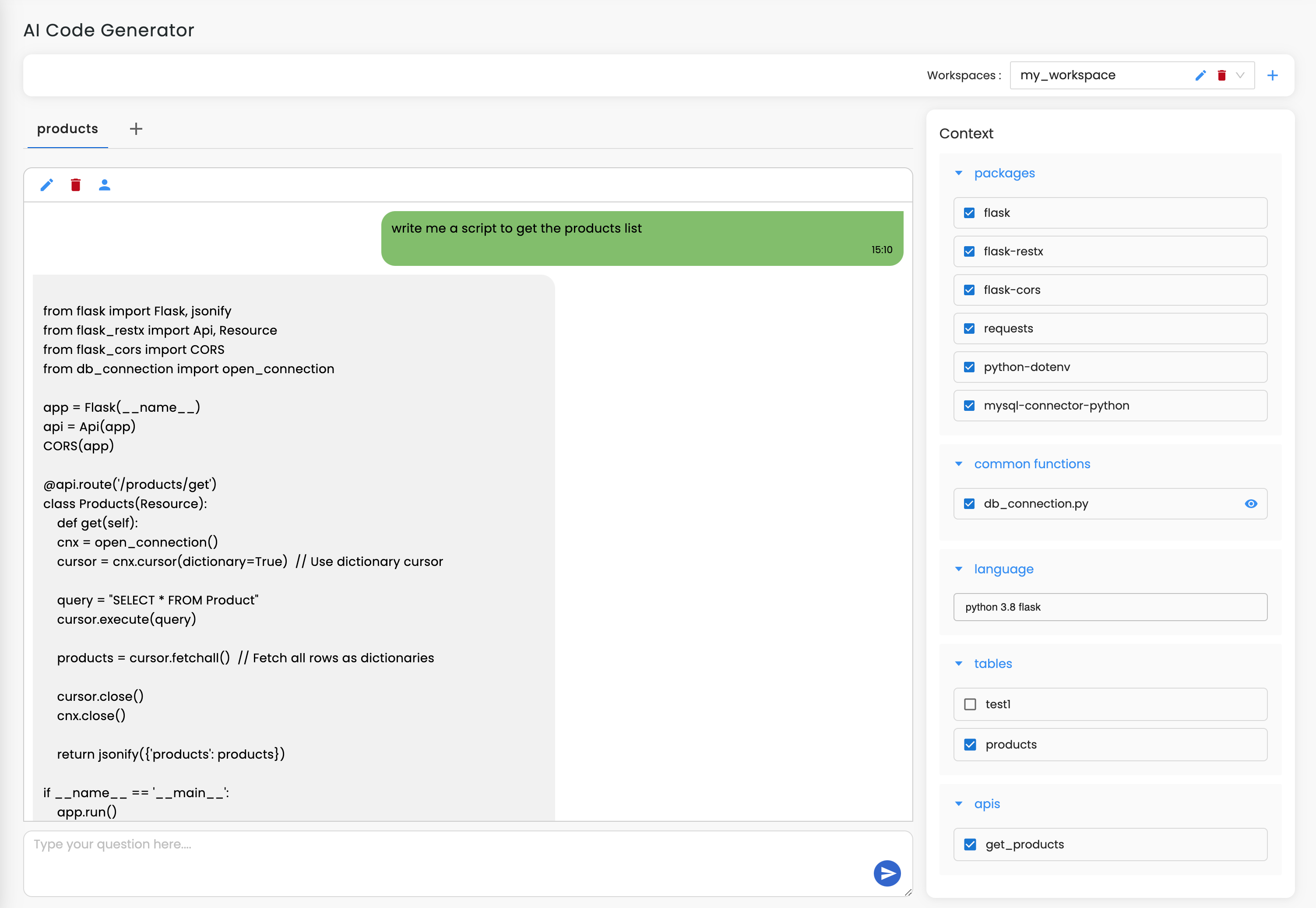
Join our community to see how developers are using Workik AI everyday.
Features

Instant Code Generation
Use AI to generate repeatable X++ and .NET code for CRUD operations and data validation in Dynamics 365.

Generate Data Insights
AI seamlessly creates tailored DAX queries and Power BI dashboards, providing analytics for finance and inventory.

Optimize Workflow Automation
AI recommends Power Automate flows for approvals and record updates to streamline processes.

Enhance User Interactions
AI helps to build JavaScript scripts to improve field validation and form interactions for dynamic user experience.
How it works
Create your Workik account manually or sign in with Google to start building your Microsoft Dynamics ERP solutions with AI.
Import your Dynamics 365 project from GitHub, GitLab, or Bitbucket. Define modules like finance, inventory, or CRM. Specify custom workflows and other needs for tailored AI assistance.
Leverage AI to generate, debug, and optimize code for Dynamics 365. Enhance functionality with automated data validation, custom reports, and role-based permissions.
Invite your team for real-time collaboration sharing insights. Use AI for a seamless deployment, ensuring optimized performance and smooth implementation.


Expand
.png)
.png)
Expand


Expand


Expand


Expand


Expand


Expand


TESTIMONIALS
Real Stories, Real Results with Workik
Workik’s AI transformed my Dynamics ERP workflow, automating code generation. It saved hours every week!

Michael Carter
Senior ERP Developer
AI-driven insights for reporting and data validation are spot-on, making Dynamics 365 projects faster and smoother.

Sarah Stanley
ERP Solutions Architect
Workik’s AI is a game-changer! Building customizations and Power BI reports has never been this quick and easy.

David Johnson
Junior Dynamics Developer
What are the top use cases of Workik's AI for Microsoft Dynamics ERP?


Popular use cases of Workik's AI-powered Dynamics ERP development for developers include but are not limited to:
* Automate workflows for data management tasks, such as inventory and financial transactions.
* Generate reusable modules optimized for specific business workflows.
* Set up integrations with external APIs like Salesforce, SAP, or custom REST APIs.
* Enhance security by creating role-based permissions and access control setups.
* Configure Dynamics 365 modules for CRM, finance, or HRM to streamline deployment.
What kind of context can I add in Workik AI related to Microsoft Dynamics ERP development?


Although setting context in Workik is optional, adding it enhances AI-generated code for Dynamics ERP projects. Here are the types of context you can add:
* Programming language (e.g., X++, C#, Javascript for backend)
* Codebase files (import Dynamics 365 projects from GitHub, GitLab, or Bitbucket)
* Libraries or extensions (e.g., Azure SDK, Power Platform connectors, .NET libraries)
* Frameworks (e.g., Entity Framework for data management and business logic)
* API blueprints (e.g., Postman or Swagger to connect external CRM or financial systems)
How does Workik AI help with financial reports in Dynamics ERP?


Workik AI simplifies reports by generating custom scripts in X++ or .NET to pull data from multiple sources—such as inventory, sales, and expenses—and compile it into reports. For example, instead of manually calculating month-end summaries, AI generates reports based on your ERP data schema.
Does Workik AI support Dynamics ERP integrations with other business software?


Yes, Workik AI can set up API calls and workflows for integrations with third-party systems like SAP, Salesforce, or proprietary business applications. Using API blueprints, Workik AI generates the necessary code for seamless data flow between Dynamics 365 and external systems, such as syncing customer orders from e-commerce platforms into Dynamics ERP for order management.
How does Workik AI enhance security management in Dynamics ERP?


Security is critical for ERP systems. Workik AI assists by generating role-based access scripts and customizing permission levels in Dynamics 365. For example, AI can create code to restrict data access based on user roles, ensuring that finance data is only accessible to authorized personnel.
Can Workik AI assist with predictive maintenance setups in Dynamics ERP?


Yes, Workik AI can help by generating code that integrates IoT data from manufacturing equipment or operational assets. For instance, AI can generate scripts to analyze sensor data and trigger maintenance tasks when certain thresholds are met.
How does Workik AI support demand forecasting in Dynamics ERP?


Workik AI generates scripts to analyze historical sales data, seasonal trends, and inventory turnover rates within Dynamics 365. For example, it can generate forecasting scripts that adjust reorder levels based on recent sales patterns, ensuring inventory aligns with projected demand and reducing stockouts.
Generate Code For Free

Microsoft Dynamics ERP: Question and Answer
Microsoft Dynamics ERP (Enterprise Resource Planning) is a suite of applications designed to streamline and automate business processes across various departments, such as finance, supply chain, customer service, and HR. It helps organizations manage data and workflows in one centralized system, offering customization options to adapt to diverse business needs. Dynamics ERP is known for its flexibility, integration capabilities, and scalability, making it a popular choice for enterprises.
Popular frameworks and libraries used with Dynamics ERP include:
Programming Language:
X++
Integration Frameworks:
Azure Logic Apps, Microsoft Power Automate
Data Handling:
Entity Framework
API Integrations:
REST APIs, OData
Security and Authentication:
Azure Active Directory
Data Visualization:
Power BI
Version Control:
GitHub, Azure DevOps
Financial Management:
Manage accounting, reporting, and budgeting processes.
Inventory and Supply Chain Management:
Optimize inventory levels, track shipments, and supply chain workflows.
Customer Relationship Management (CRM):
Centralize customer data to improve lead tracking, customer service, and sales management.
Human Resource Management (HRM):
Streamline HR processes, including employee onboarding, payroll, and performance tracking.
Project Management:
Manage resources, track project progress, and oversee budgets.
Career opportunities and technical roles for professionals in Microsoft Dynamics ERP include ERP Developer, X++ Developer, Dynamics 365 Functional Consultant, Dynamics Integration Specialist, CRM Developer, Financial Solutions Architect, ERP System Administrator, Business Analyst, and ERP Solutions Architect.
Code Generation:
X++ and .NET code for workflows like data validation and financial transactions.
Data Integration:
Connect Dynamics 365 with external systems like Salesforce or SAP through AI-generated API scripts.
Report Automation:
Generate tailored Power BI reports to provide insights, including inventory, sales, and financial metrics.
Security Configuration:
Use AI to set up role-based access controls.
Workflow Automation:
Automate routine workflows with Power Automate for approvals, notifications, and record updates.
Testing:
Configure testing to validate code functionality, improving quality and reliability.
Debugging:
Use AI to identify and resolve code issues quickly.
Explore more on Workik
Get in touch
Don't miss any updates of our product.
© Workik Inc. 2026 All rights reserved.

